-
 Bitcoin
Bitcoin $85,226.4241
0.37% -
 Ethereum
Ethereum $1,634.4582
-0.14% -
 Tether USDt
Tether USDt $0.9998
0.02% -
 XRP
XRP $2.1429
-0.36% -
 BNB
BNB $586.6835
-0.41% -
 Solana
Solana $130.1558
-2.71% -
 USDC
USDC $0.9999
0.01% -
 TRON
TRON $0.2533
-1.21% -
 Dogecoin
Dogecoin $0.1599
-3.80% -
 Cardano
Cardano $0.6420
-1.31% -
 UNUS SED LEO
UNUS SED LEO $9.4354
0.17% -
 Avalanche
Avalanche $20.1457
0.21% -
 Chainlink
Chainlink $12.6486
-1.47% -
 Stellar
Stellar $0.2412
-0.10% -
 Toncoin
Toncoin $2.9186
2.06% -
 Sui
Sui $2.1816
-3.81% -
 Shiba Inu
Shiba Inu $0.0...01193
-3.05% -
 Hedera
Hedera $0.1663
-1.76% -
 Bitcoin Cash
Bitcoin Cash $329.7279
-5.98% -
 Litecoin
Litecoin $78.4868
-0.87% -
 Polkadot
Polkadot $3.6637
-1.52% -
 Hyperliquid
Hyperliquid $16.1727
1.65% -
 Dai
Dai $0.9999
-0.01% -
 Bitget Token
Bitget Token $4.3098
0.30% -
 Pi
Pi $0.7446
-1.23% -
 Ethena USDe
Ethena USDe $0.9992
0.04% -
 Monero
Monero $211.5381
2.89% -
 Uniswap
Uniswap $5.3691
-1.75% -
 OKB
OKB $51.9560
-2.01% -
 Pepe
Pepe $0.0...07310
-3.43%
What are private and public keys? How do they protect asset security in blockchain?
Blockchain security relies on public-private key pairs: your private key is a secret code granting sole access to your crypto, while your public key, derived from it, acts as your digital address. Losing your private key means irreversible loss of your funds.
Mar 05, 2025 at 10:12 am
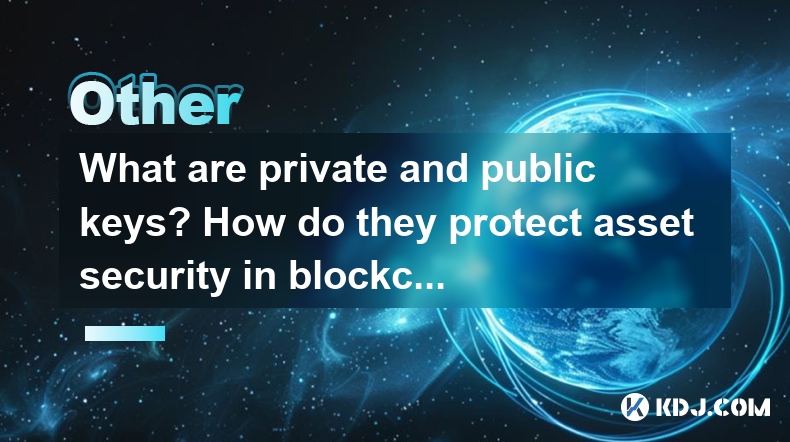
Key Points:
- Private keys are secret codes, analogous to a password, providing sole access to your cryptocurrency. They must be kept absolutely confidential.
- Public keys are derived from private keys and act like your digital address. They can be shared freely without compromising security.
- Together, they form the basis of digital signatures, ensuring transaction authenticity and preventing unauthorized spending.
- Blockchain technology leverages cryptography to secure transactions using this public-private key pair system.
- Loss of a private key means irreversible loss of access to your cryptocurrency.
What are Private and Public Keys? How do they Protect Asset Security in Blockchain?
Understanding private and public keys is fundamental to grasping how blockchain secures cryptocurrency. They are the cornerstone of cryptographic security in this decentralized system. Think of them as a highly sophisticated lock and key mechanism, far more secure than traditional methods.
A private key is a long, randomly generated string of characters (often hexadecimal). It’s essentially your secret password to your cryptocurrency. Only you should ever know this key. Sharing it with anyone, even unintentionally, grants them complete control over your funds. This is why securing your private key is paramount.
In contrast, a public key is also a long string of characters, but it's derived mathematically from your private key using complex cryptographic algorithms. This key can be freely shared – it's like your digital address. Others use your public key to send you cryptocurrency. The crucial aspect is that even with your public key, nobody can deduce your private key.
The relationship between these keys lies at the heart of blockchain's security. They underpin the process of digital signatures, which verify the authenticity of transactions. When you send cryptocurrency, your private key is used to create a digital signature for the transaction. This signature proves that you authorized the transaction. The public key then allows the blockchain network to verify this signature, ensuring that only the rightful owner can spend the funds.
The security of this system rests on the one-way nature of the cryptographic functions. It's computationally infeasible to derive the private key from the public key, meaning even with the most powerful computers, it would take an impractically long time to crack the code. This one-way function is the foundation of the security of all blockchain transactions. The algorithm employed typically uses elliptic curve cryptography (ECC), renowned for its strength and efficiency.
The blockchain itself further enhances security. Every transaction is recorded publicly and immutably on the distributed ledger. This transparency allows the network to independently verify the validity of each transaction, ensuring no fraudulent activity goes unnoticed. The decentralized nature prevents single points of failure, making it extremely resilient against attacks.
However, the security of your assets ultimately rests on your ability to safeguard your private key. Losing your private key means losing access to your cryptocurrency forever. There is no way to recover it. This is why using secure wallets, employing strong password practices, and regularly backing up your private keys are crucial steps. Never store your private key on a compromised device or in an easily accessible location.
The strength of blockchain security also relies on the strength of the cryptographic algorithms employed. Regular security audits and updates to these algorithms are necessary to maintain the system's resilience against evolving threats. As technology advances, so must the security measures to ensure the integrity of the blockchain network.
Different cryptocurrencies utilize slightly varying cryptographic methods, but the fundamental principle of the public-private key pair remains constant. The specific implementation details might vary, but the underlying concept of secure, verifiable transactions through cryptographic signatures remains the same.
Remember, your private key is the absolute key to your digital assets. Treat it with the utmost care and secrecy.
Frequently Asked Questions:
Q: What happens if I lose my private key?
A: Losing your private key means irreversible loss of access to your cryptocurrency. There's no recovery mechanism. Consider it like losing the only key to a vault containing your assets.
Q: Can someone steal my cryptocurrency with my public key?
A: No. Your public key cannot be used to access your private key or spend your cryptocurrency. It only allows others to send you funds. Think of it as your bank account number – sharing it doesn't give anyone access to your funds.
Q: How can I securely store my private key?
A: Use hardware wallets (physical devices designed for secure key storage), reputable software wallets with strong security features, or write it down on paper and store it securely offline. Never store it digitally on easily accessible locations.
Q: What are the different types of wallets?
A: There are hardware wallets (offline storage), software wallets (desktop or mobile applications), and paper wallets (private keys written down). Each has its advantages and disadvantages regarding security and convenience.
Q: What is a seed phrase?
A: A seed phrase is a list of words that can be used to recover your private keys. It's crucial to keep this phrase secure, as it essentially holds the key to your cryptocurrency.
Q: How does blockchain prevent double-spending?
A: The blockchain's distributed and immutable nature prevents double-spending. Once a transaction is verified and added to the blockchain, it cannot be altered or reversed, preventing the same cryptocurrency from being spent twice. The cryptographic signatures verify the transaction's legitimacy.
Disclaimer:info@kdj.com
The information provided is not trading advice. kdj.com does not assume any responsibility for any investments made based on the information provided in this article. Cryptocurrencies are highly volatile and it is highly recommended that you invest with caution after thorough research!
If you believe that the content used on this website infringes your copyright, please contact us immediately (info@kdj.com) and we will delete it promptly.
- Bitcoin (BTC) Price Starts a Fresh Increase Above the $83,500 Zone
- 2025-04-15 13:00:12
- The amount of Bitcoin held on the books of publicly traded companies rose by 16.1% in the first quarter of 2025
- 2025-04-15 13:00:12
- title: The amount of Bitcoin held on the books of publicly traded companies rose by 16.1% in the first quarter of 2025
- 2025-04-15 12:55:12
- By the end of 2024, the total size of CeFi loans will be US$11.2 billion
- 2025-04-15 12:55:12
- MAGACOINFINANCE – Urgent Entry Point Before 25x Window Closes
- 2025-04-15 12:50:12
- Bitcoin (BTC) Price Shows Signs of Stabilization Following Correction This Month
- 2025-04-15 12:50:12
Related knowledge

Does the ranking of Chinese blockchain apps include cross-chain applications?
Apr 14,2025 at 04:00pm
The ranking of Chinese blockchain apps is a comprehensive evaluation that takes into account various aspects such as user base, transaction volume, and technological innovation. A pertinent question arises regarding whether these rankings include cross-chain applications. Cross-chain applications, which allow different blockchain networks to interact an...
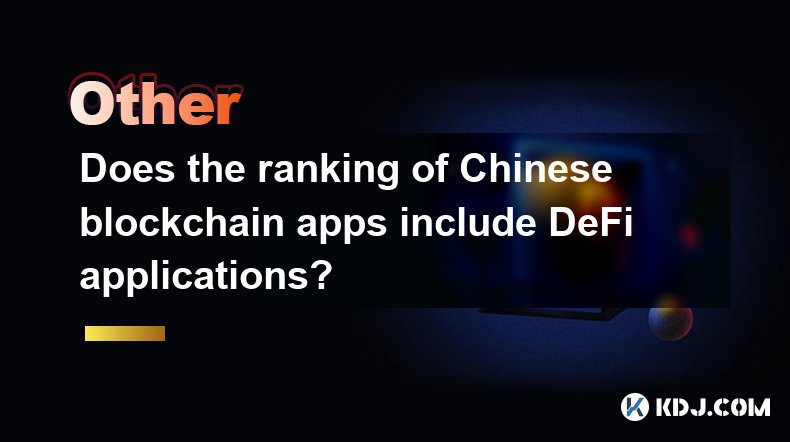
Does the ranking of Chinese blockchain apps include DeFi applications?
Apr 15,2025 at 06:57am
The ranking of Chinese blockchain apps is a comprehensive list that showcases the most popular and influential applications within the cryptocurrency ecosystem. One question that often arises is whether these rankings include DeFi applications. To answer this, we need to delve into the specifics of how these rankings are compiled and what types of appli...
Does the ranking of Chinese blockchain apps include enterprise-level applications?
Apr 15,2025 at 06:42am
The ranking of Chinese blockchain apps often includes a variety of applications, ranging from consumer-focused to enterprise-level solutions. Understanding the scope and criteria for these rankings is essential to determine if enterprise-level applications are included. This article delves into the specifics of how Chinese blockchain app rankings are co...
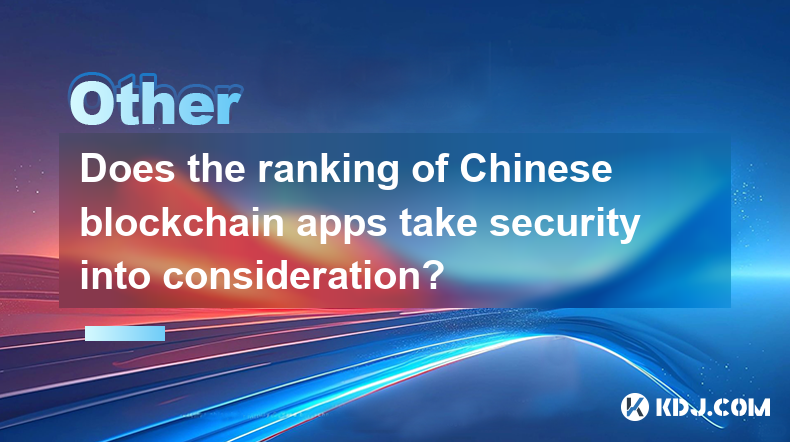
Does the ranking of Chinese blockchain apps take security into consideration?
Apr 14,2025 at 05:00pm
The ranking of Chinese blockchain apps indeed takes security into consideration, as it is a crucial factor in the overall evaluation of these applications. Security is not only about protecting users' data and assets but also about ensuring the integrity and reliability of the blockchain network itself. In this article, we will delve into how security i...
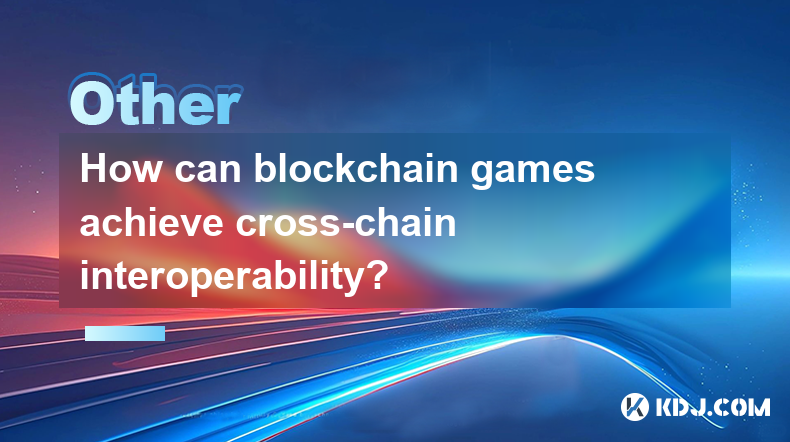
How can blockchain games achieve cross-chain interoperability?
Apr 15,2025 at 02:56am
Blockchain games have become increasingly popular in the cryptocurrency ecosystem, offering players the ability to earn digital assets while playing. One of the key challenges these games face is achieving cross-chain interoperability, which allows assets and data to move seamlessly between different blockchain networks. This article explores the variou...

How can blockchain games attract developers to join the ecosystem?
Apr 14,2025 at 04:57pm
Blockchain games represent a burgeoning sector within the cryptocurrency ecosystem, offering unique opportunities for developers to create innovative gaming experiences that integrate decentralized technologies. To attract developers to join the blockchain gaming ecosystem, several strategies can be employed. These strategies not only appeal to develope...

Does the ranking of Chinese blockchain apps include cross-chain applications?
Apr 14,2025 at 04:00pm
The ranking of Chinese blockchain apps is a comprehensive evaluation that takes into account various aspects such as user base, transaction volume, and technological innovation. A pertinent question arises regarding whether these rankings include cross-chain applications. Cross-chain applications, which allow different blockchain networks to interact an...

Does the ranking of Chinese blockchain apps include DeFi applications?
Apr 15,2025 at 06:57am
The ranking of Chinese blockchain apps is a comprehensive list that showcases the most popular and influential applications within the cryptocurrency ecosystem. One question that often arises is whether these rankings include DeFi applications. To answer this, we need to delve into the specifics of how these rankings are compiled and what types of appli...

Does the ranking of Chinese blockchain apps include enterprise-level applications?
Apr 15,2025 at 06:42am
The ranking of Chinese blockchain apps often includes a variety of applications, ranging from consumer-focused to enterprise-level solutions. Understanding the scope and criteria for these rankings is essential to determine if enterprise-level applications are included. This article delves into the specifics of how Chinese blockchain app rankings are co...

Does the ranking of Chinese blockchain apps take security into consideration?
Apr 14,2025 at 05:00pm
The ranking of Chinese blockchain apps indeed takes security into consideration, as it is a crucial factor in the overall evaluation of these applications. Security is not only about protecting users' data and assets but also about ensuring the integrity and reliability of the blockchain network itself. In this article, we will delve into how security i...

How can blockchain games achieve cross-chain interoperability?
Apr 15,2025 at 02:56am
Blockchain games have become increasingly popular in the cryptocurrency ecosystem, offering players the ability to earn digital assets while playing. One of the key challenges these games face is achieving cross-chain interoperability, which allows assets and data to move seamlessly between different blockchain networks. This article explores the variou...

How can blockchain games attract developers to join the ecosystem?
Apr 14,2025 at 04:57pm
Blockchain games represent a burgeoning sector within the cryptocurrency ecosystem, offering unique opportunities for developers to create innovative gaming experiences that integrate decentralized technologies. To attract developers to join the blockchain gaming ecosystem, several strategies can be employed. These strategies not only appeal to develope...
See all articles























































































